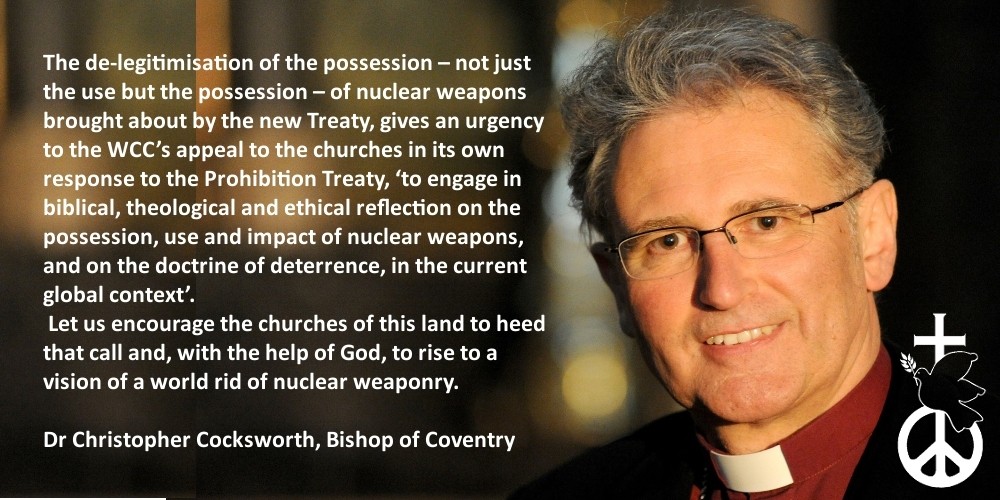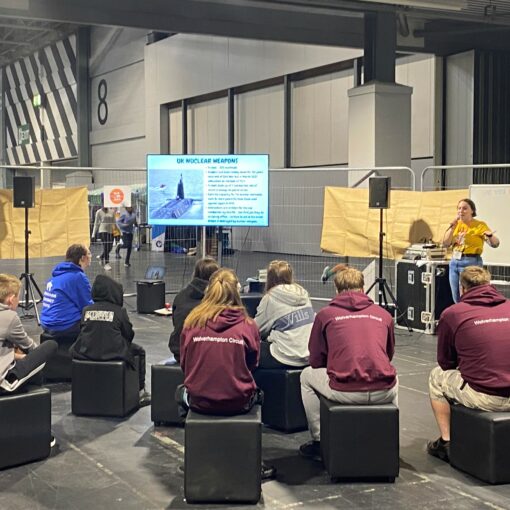On Saturday 6 October 2018, Christian CND held its annual Conference and AGM in Coventry. During the Conference we received a message from the Bishop of Coventry, who was unable to join us for the day. With his kind permission it is reproduced in its entirety below.
Dear Sisters and Brothers,
I am delighted that you have come to Coventry for your AGM and I am sorry not to be with you in person.
You come in the Centenary Year of the Diocese and its great Cathedral. In 1918, with the dark clouds of war still shrouding the country, the ancient medieval Diocese of Coventry was revived in its modern form. It was an extraordinary act of prophetic determination to bring the hope of the gospel into the trauma of war, and the light of Christ to the task of rebuilding people’s lives, their communities and their nation, when the destruction and killing was over.
‘Deo Adjuvante Resurgo’ – With God’s help, I rise’ – the first bishop of the new Diocese had inscribed on his tomb in St Michael’s Cathedral when his work was done. More prophetic words, not only spoken in faith over his own future but to become astoundingly apt for his Cathedral and Diocese. They are among the few things that survived the destruction of St Michael’s Cathedral on 14thNovember 1940 after the Luftwaffe’s bombs rained down fire and explosives upon the city in a terrible night of terror.
The remarkable Provost of the time, Dick Howard, whose efforts to save the Cathedral had failed the night before, declared another prophecy on the morning afterwards – ‘We will build a new Cathedral’. More hope in despair; more light in darkness; more love in days of hate; and in his BBC Christmas sermon a few weeks later, broadcast to the then empire, a vision for a new sort of world, ‘a kinder, gentler – more Christ-Child-like sort of world beyond this strife’, where enemies become reconciled as friends.
You are meeting a few months after the General Synod of the Church of England voted to welcome the UN Treaty on the Prohibition of Nuclear Weapons as a ‘clear signal’ that ‘nuclear weapons are both dangerous and unnecessary’ and to call upon our Government to ‘reiterate publicly its obligations under Article VI of the UN Non-Proliferation Treaty and its strategy for meeting them’.
It was a finely balanced motion designed to bring the Synod into a positive majority that would commit itself to the ‘elimination’ of nuclear weapons ‘across the world’. But it was not prophetic. So it remains the task of Christian CND to add prophetic edge to the Church’s voice – to call for the UK to take decisive steps to end our possession of nuclear weapons in a way that steps out from, and ahead of, other nuclear states.
I suggest that one particular way in which Christian CND can do that is to remind the Church of England – and its Bishops – of the Bishop’s Pastoral Letter before the last election, ‘Who is my Neighbour?, which said, ‘Shifts in global strategic realities mean that the traditional arguments for nuclear deterrence need re-examining’.
It is those shifts that have led to the new, and prophetic, UN Treaty on the Prohibition of Nuclear Weapons – a radical development in international politics that undermines the military and moral assumptions of the Non-Proliferation Treaty. So I would encourage Christian CND to call for a thorough Christian scrutiny of the doctrine of deterrence that has been so influential – even in the Christian conscience – in justifying the unjustifiable.
The de-legitimisation of the possession – not just the use but the possession – of nuclear weapons brought about by the new Treaty, gives an urgency to the WCC’s appeal to the churches in its own response to the Prohibition Treaty, ‘to engage in biblical, theological and ethical reflection on the possession, use and impact of nuclear weapons, and on the doctrine of deterrence, in the current global context’.
Let us encourage the churches of this land to heed that call and, with the help of God, to rise to a vision of a world rid of nuclear weaponry.




